Rural IT in Lithuania: Challenges and Opportunities for Local Communities

Lithuania is a European country with a lot of history and a beautiful landscape. Most of the country is rural, covering about 85% of the land.
In 2023, around 901.758 people lived in rural areas, a small increase from the previous year. In total, about 68.47% of the population lives in cities, while 31.53% lives in rural areas, according to Statista.
Even though Lithuania has some of the lowest rural population densities in the EU, rural areas in Lithuania benefit from opportunities to use technologies.
Here we will discuss the current developments in the Lithuanian IT industry, its challenges, and the benefits of using IT in the rural areas of the country.
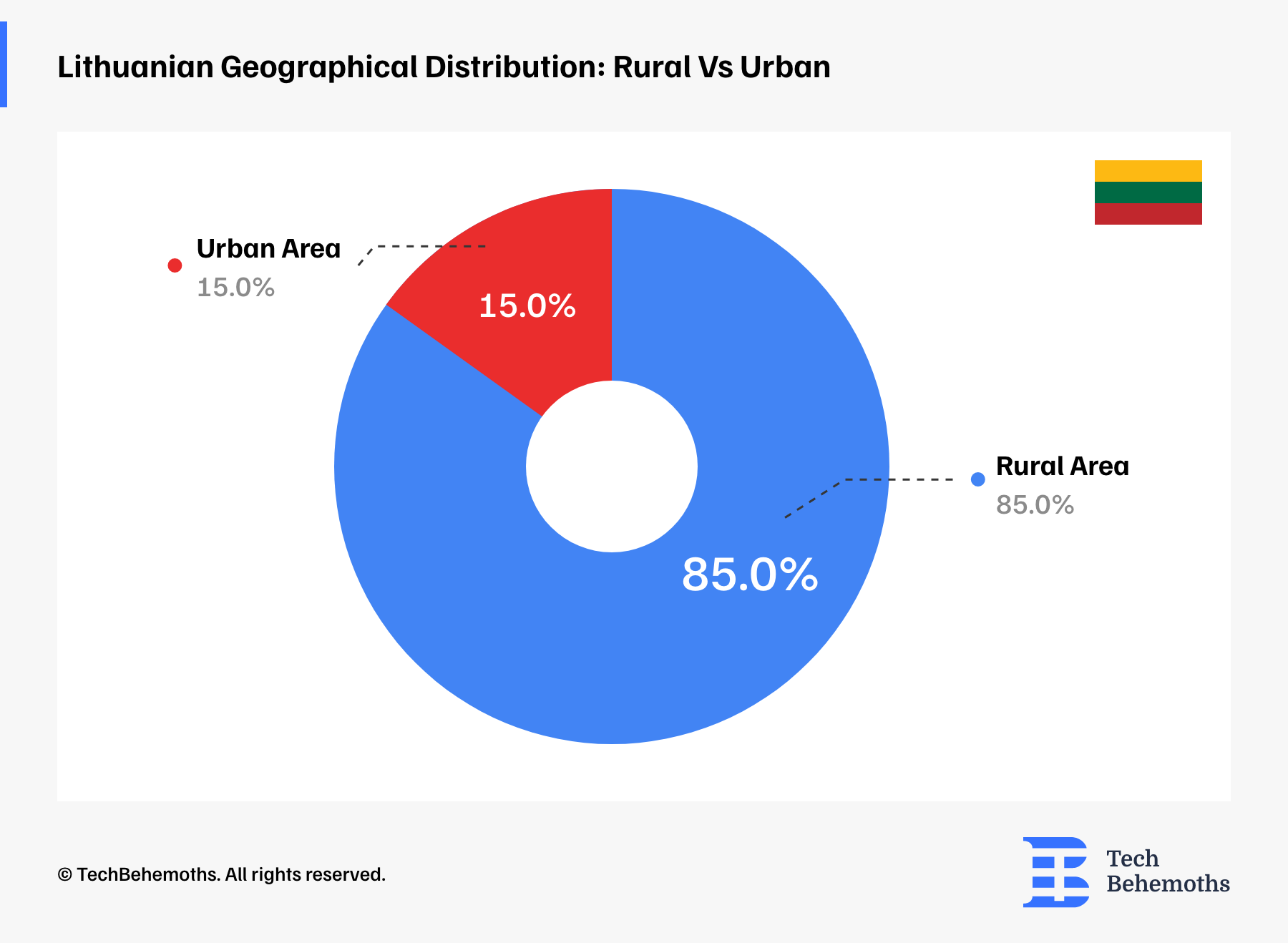
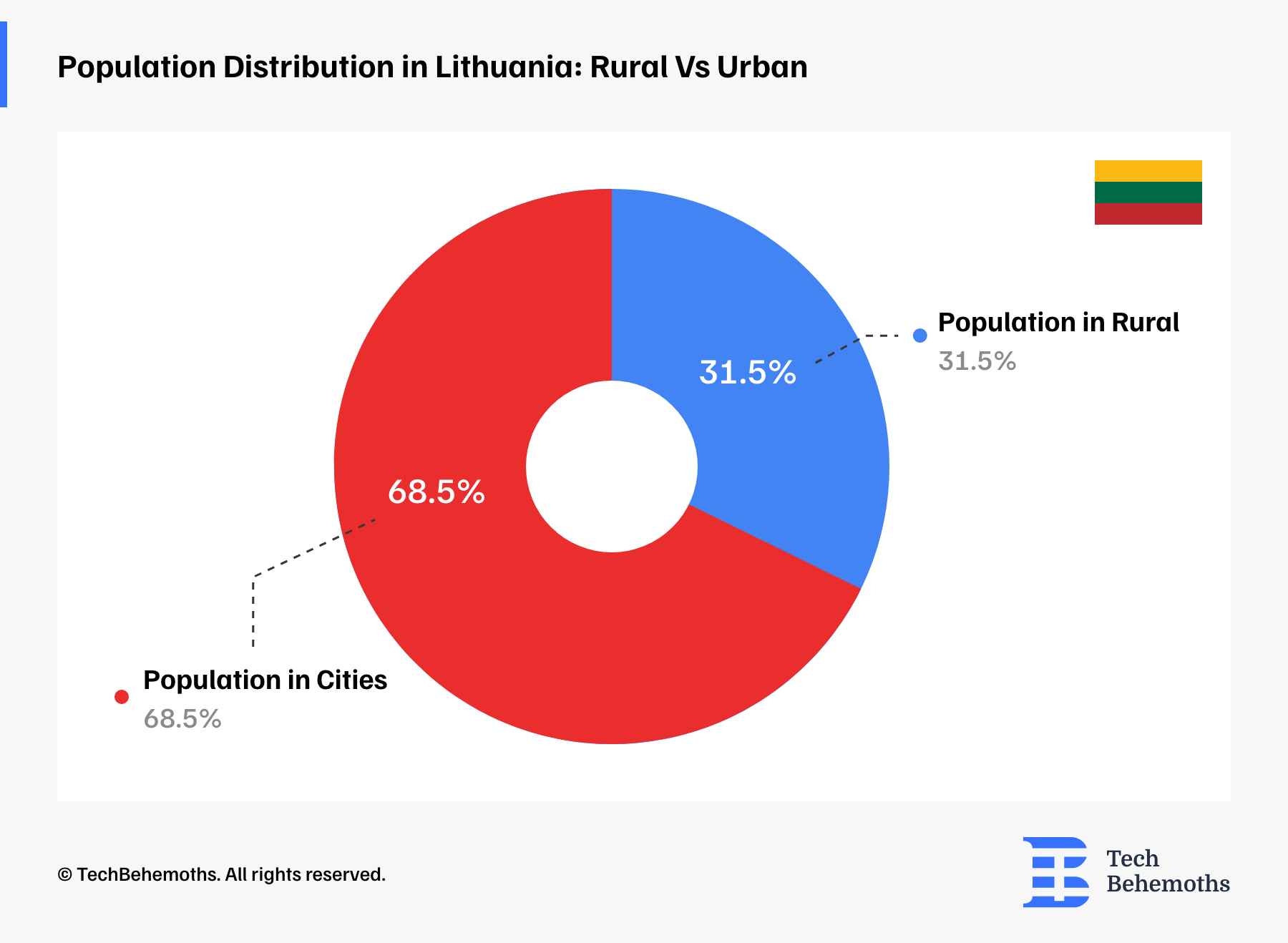
What Does “Rural IT” Mean?
Rural IT can have different meanings depending on the context, but two of them are more common:
-
The 1st is about using technology in rural areas
-
The 2nd is about IT companies that are located in rural areas
To be more specific, "rural IT" covers things like providing internet access, mobile phone coverage, and smart farming by using technology like drones, sensors, and data analysis to improve agricultural efficiency.
At the same time, it helps rural businesses join the online world through e-commerce and online learning, creates job opportunities, and makes it easier for people to work remotely. Rural IT also aims to bring money and investment to help the area grow.
So rural IT plays a significant role in the progress of rural communities.
Rural IT Opportunities in Lithuania
If you are wondering if rural IT exists in Lithuania, we will answer that “Yes”, and it is definitely growing! We invite you to see some evidence of this:
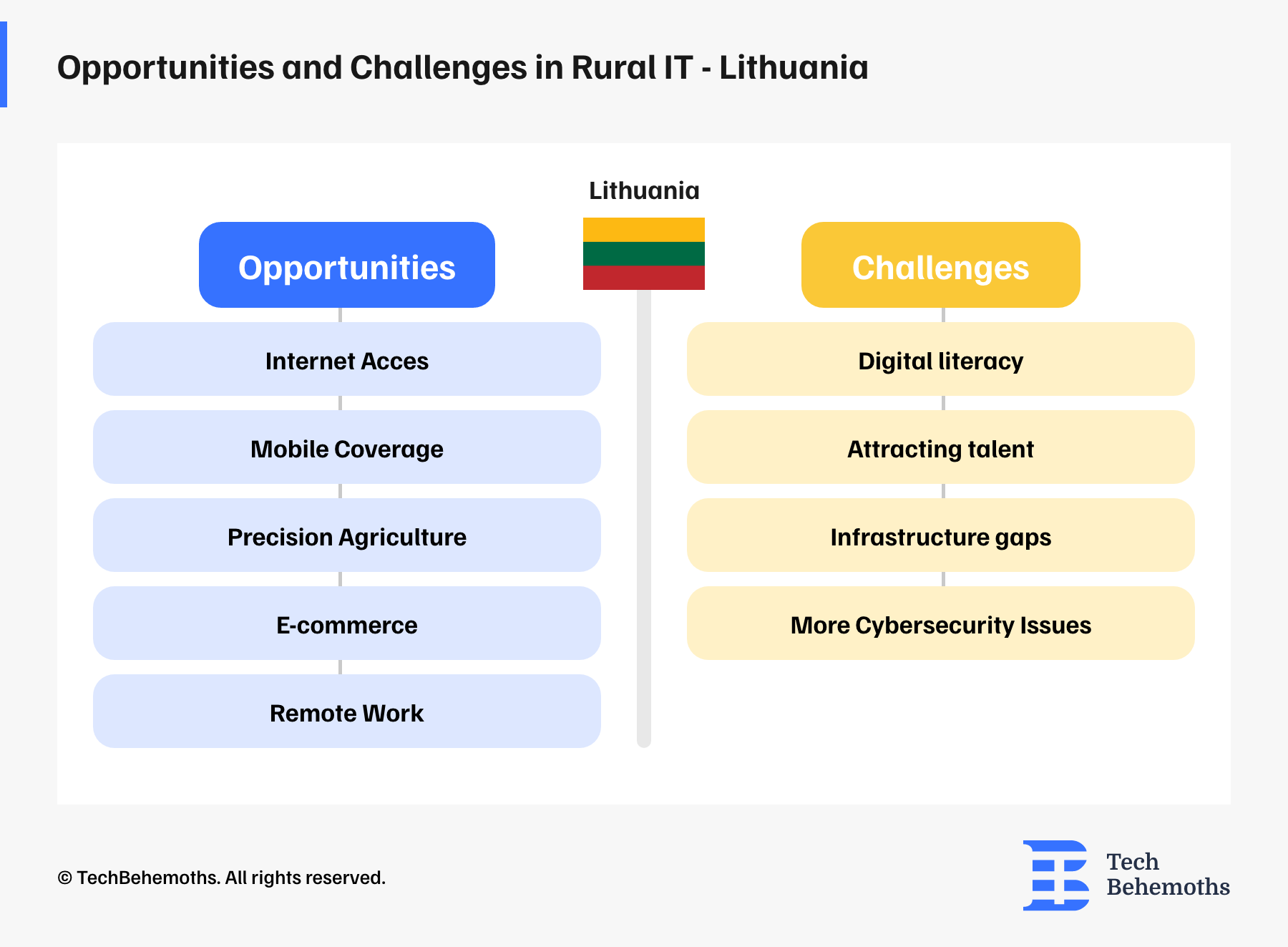
Internet Access
Lithuania demonstrates high internet penetration rates. Over 90% of households in rural areas have access to the Internet, which means the possibility to learn from top universities online, connect with doctors from anywhere, keep in touch with family and friends across the globe and even starting own business from your home. All these possibilities wouldn't exist if it were not for government initiatives and private investments in the development of fiber optic networks.
Lithuania aims to provide super-fast internet (at least 100 Mbps) to homes and public places in cities and rural areas by 2027. This initiative is supported by the Digital Agenda and Information Society Development Programme. They want to create a Gigabit society for everyone.
Mobile Coverage
Most rural Lithuania has good mobile coverage, enabling communication and access to online services. Over 94.5% of the country is covered by 4G networks. This ensures that people in most rural areas can enjoy fast internet for various online activities like browsing and video calls. When it comes to 5G, it's mainly available in major cities. However, efforts are being made to expand 5G across the country. The top mobile operators in Lithuania are BITĖ, Tele2, and Telia. Last year, Telia was the first to launch 5G services in Lithuania
RRT Deputy Director A. Čėsna advises users to check detailed maps for the strongest mobile signal, as there's a global shift from 3G to faster 4G and 5G technologies. Users are encouraged to choose devices supporting these advancements for better data transmission quality and speed, reflecting market trends and anticipating improved results in the future.
Precision Agriculture
Precision agriculture is like smart farming. Farmers use technology, like drones and sensors, to collect data on crops, soil, and weather. They analyze this data with software to make better decisions about irrigation, fertilization, and pest control. This helps increase yields, reduce costs, and is better for the environment.
Lithuanian farmers are increasingly adopting these technologies using precision agriculture for various crops. All these are possible with the support of the government and private companies that provide services. Here the PRIP project funded largely by the European Agricultural Fund for Rural Development to improve internet connectivity in rural areas, including farms and agricultural enterprises, should be mentioned.
So precision agriculture is a modern and efficient way to farm, benefiting both farmers and the environment.
E-commerce and Online Services
E-commerce and online services are transforming rural Lithuania, bringing new opportunities. Rural businesses are increasingly using e-commerce platforms like Pigu.lt, Etsy, and even Facebook Marketplace to sell their unique products, such as handmade crafts, organic products, or specialty food products, to an audience national and even wider international, making it possible for customers to reach beyond their local markets.
Additionally, online education and telemedicine are becoming more accessible in rural areas.
Online learning helps rural students access quality education, especially for specialized subjects or higher education. Platforms like eTwinning Lithuania connect schools across Europe for collaborative projects. In Lithuania, the official online learning platform, Mokymosi, offers courses and resources for various subjects and levels. Additionally, Kaunas University of Technology (KTU) Online provides online bachelor's and master's degrees in fields like engineering and business.
Telemedicine offers virtual consultations, reducing travel time and costs for rural patients. Teletherapy services are expanding in rural areas, providing mental health support to those who may not have access to in-person therapy. Such platforms like eSveikata, Vaiko Sveikata, and Vaikų Psichiatrijos Centras allow patients to access medical records, prescriptions, and online consultations with doctors
This way online services raise rural e-commerce, bridge the educational gap, and bring healthcare closer.
Remote Work and Digital Nomadism
Lithuania is an attractive destination for remote workers and digital nomads due to its lower cost of living compared to Western Europe. More than 200,000 people from different countries are now living in Lithuania, which is a record for the country. These numbers come from the Migration Department's statistics as of September 1st. Skilled professionals in fields like IT and engineering are finding it easier to immigrate to Lithuania due to favorable rules. The country offers a wealth of opportunities, strong internet connectivity for remote work, and government support through initiatives such as co-working spaces, visa options, and tax incentives. As a result, the number of these professionals living in the country is growing steadily each year.
This trend is also injected into rural areas, bringing new talent and economic activity there.
Here are some examples that prove the above statement.
Case Studies
- Vilnijos apskritis is a thriving rural community with several IT companies, including software development firms such as Baltic Amadeus, data centers, and device manufacturers such as Teltonika Telematics, etc. All provide employment opportunities and stimulate the local economy. The presence of IT companies contributes to local tax revenue, which the government can reinvest in infrastructure, education, and social services.
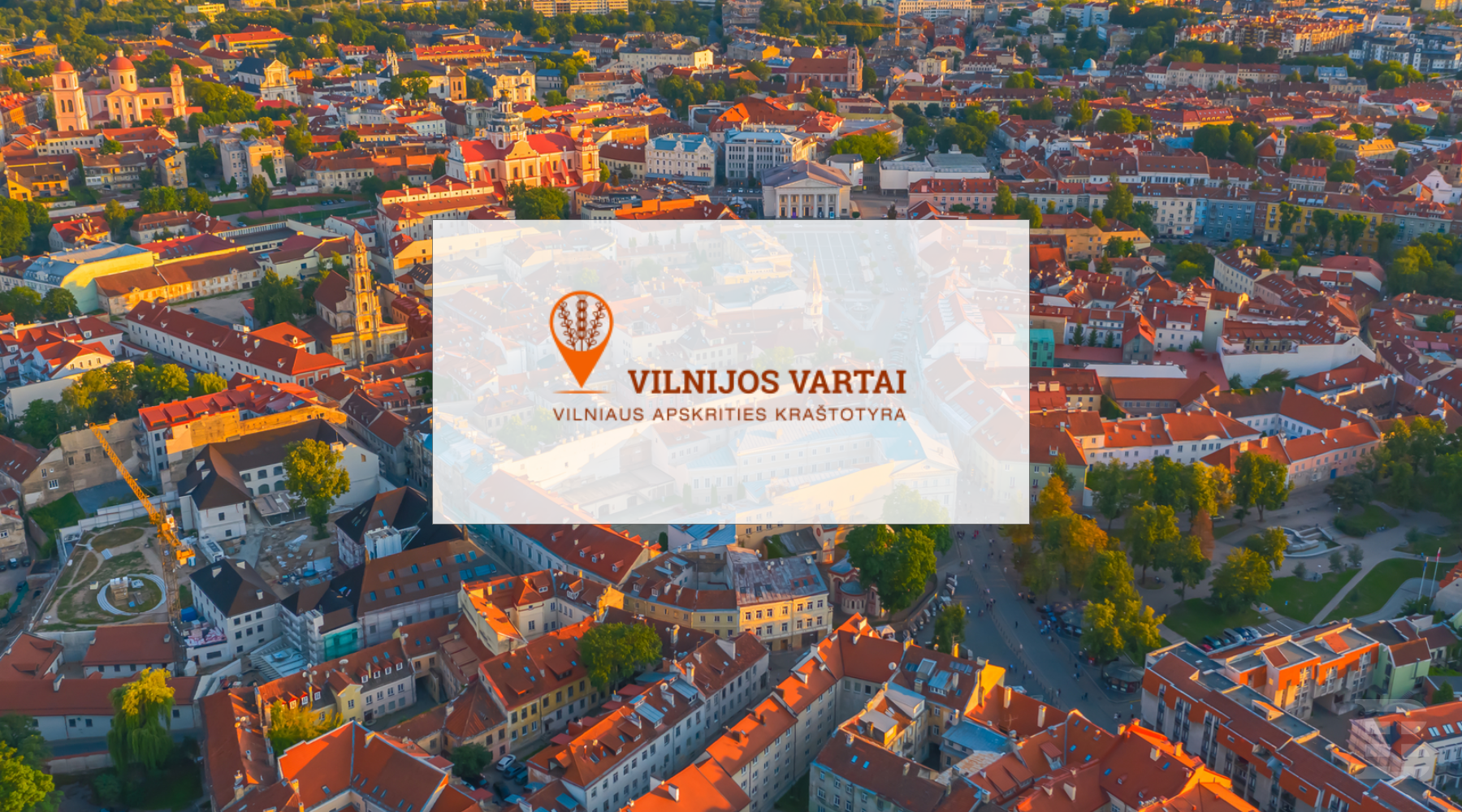
- Kaunas Technology Park showcases how technology hubs can attract remote workers and businesses. This park is located outside the city of Kaunas. It houses over 100 companies in IT, engineering, health tech, fintech, cyber security, and more, creating jobs and attracting talent to the region. The park is part of the "Santaka" Integrated Science, Studies, and Business Centre and is a key player in the local and international tech scene.
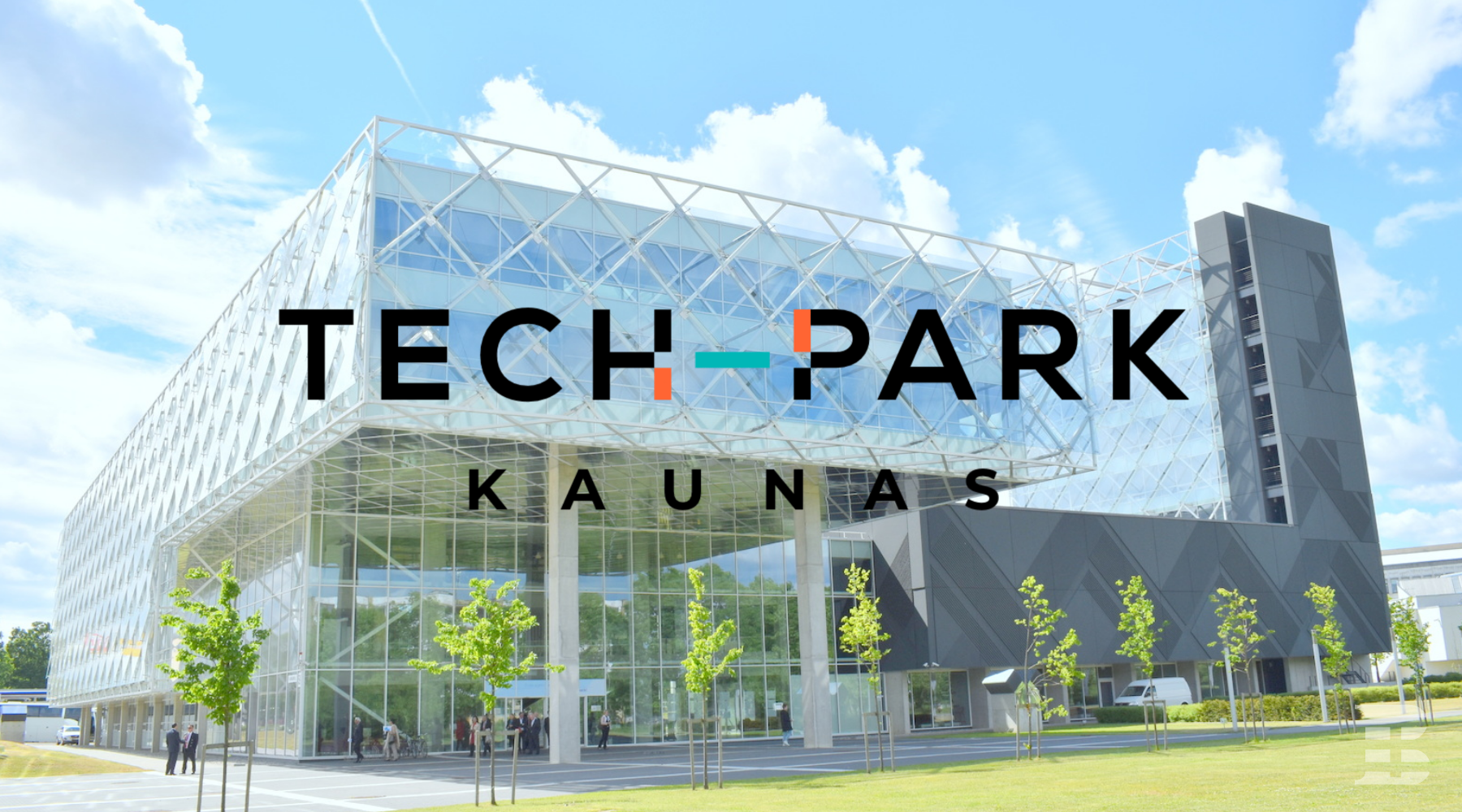
- Lithuanians Abroad Homecoming: Many Lithuanian IT professionals living abroad choose to return to their rural hometowns and start businesses, contributing their knowledge and skills to local development. Such examples include the success story of Vilgailė Striužaitė, an IT business consultant who, as a fresh graduate, decided to move to India, after 6 years, Vilgailė finally decided to return to Lithuania, believing that she was her real home. Living abroad strengthened her appreciation for Lithuania, motivating her to contribute to its well-being, recognizing that it may not be perfect, but it is a place where she can make a positive impact. This is just an example, but many similar stories are emerging across Lithuania.

Beyond the opportunities, there are also challenges in rural IT in Lithuania. Let's find them out further.
Challenges in Rural IT in Lithuania
The challenges of Rural IT in Lithuania need a multifaceted approach. Three main challenges to be noted are digital literacy, attracting talent, and infrastructure gaps.
Tech Literacy
In Lithuania, 71% of people between 16 and 19 years old are good with digital skills, which is higher than the average in the European Union (57%). Older age groups, however, report significantly lower shares.
As well as, Much of the rural population may be less familiar with technology, so they need support and training. At the same time, the lack of resources in local languages makes it difficult for non-Lithuanian speakers to access training materials and support.
Another obstacle is misinformation, rural communities may not be fully aware of the benefits and opportunities offered by digital skills, hindering motivation to participate. That is why it is important to support them in increasing their motivation to learn, as their participation is crucial for the digital economy.
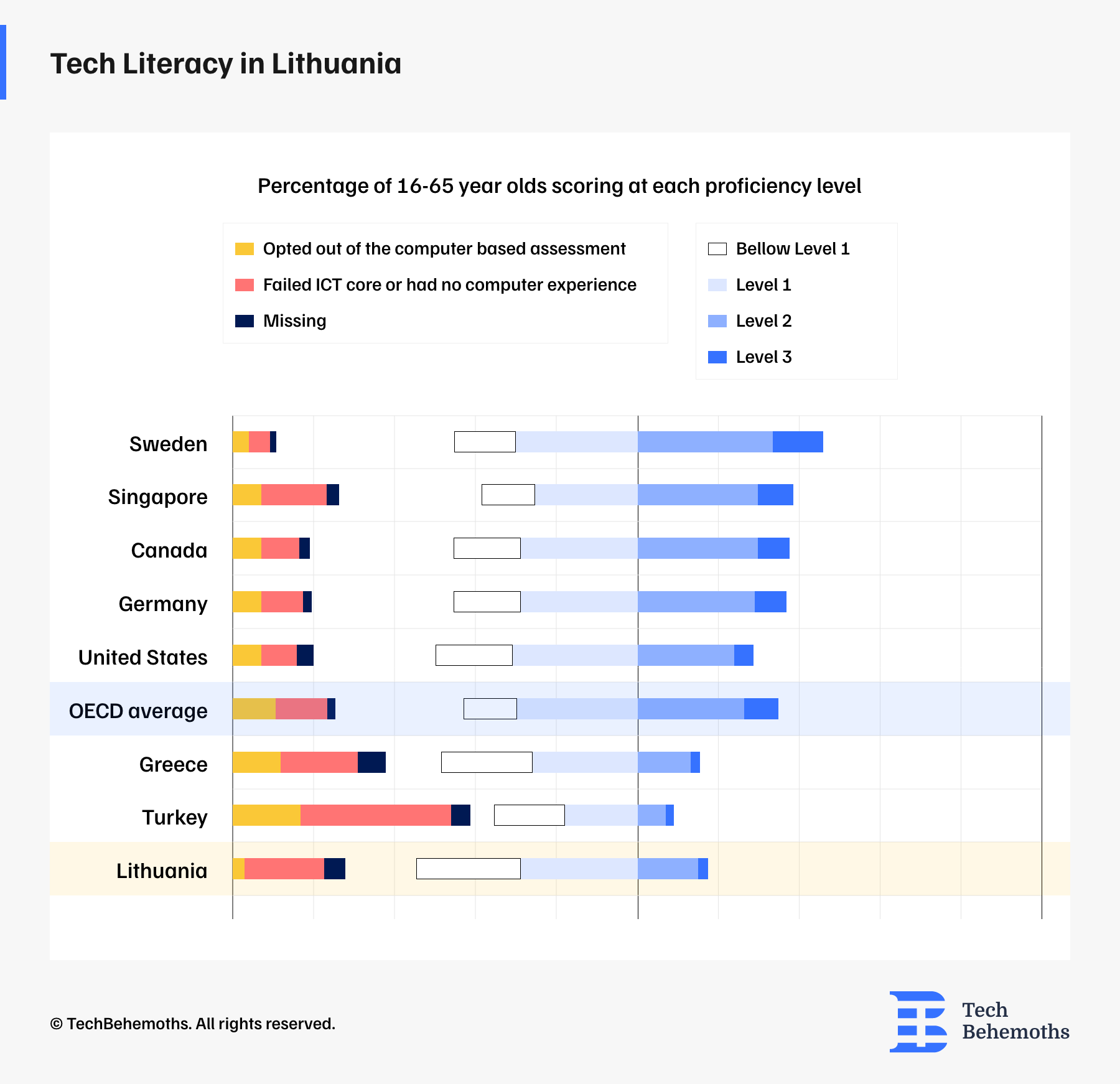
Attracting Talent
While rural areas offer advantages such as lower costs and quiet living, attracting and retaining skilled IT professionals remains a challenge. But why?
-
Limited career opportunities, no diverse, high-paying IT jobs. The minimum wage remained at 840 euros/month in Q3 2023 and the limited number of employers restricts the options. Young professionals want various IT roles in fields such as data science, cyber security, or software development, but these options are virtually non-existent or few in rural areas.
-
The lack of social and cultural activities makes rural areas less attractive for young professionals.
-
The difficulty of commuting between rural and urban areas discourages potential employees.
All this is causing skilled professionals to move to urban centers.
Infrastructure gaps
Even though progress has been made, some rural areas still experience limited internet speeds or unreliable connectivity. On the one hand, small rural communities struggle to secure funds for infrastructure upgrades, slowing progress, on the other hand, monopoly Internet Providers may be reluctant to invest in rural connectivity due to perceived lower profitability.
Now let's discover the most developed and underdeveloped regions of Lithuania for rural IT.
Lithuania's Rural IT: Mapping Development and Opportunities
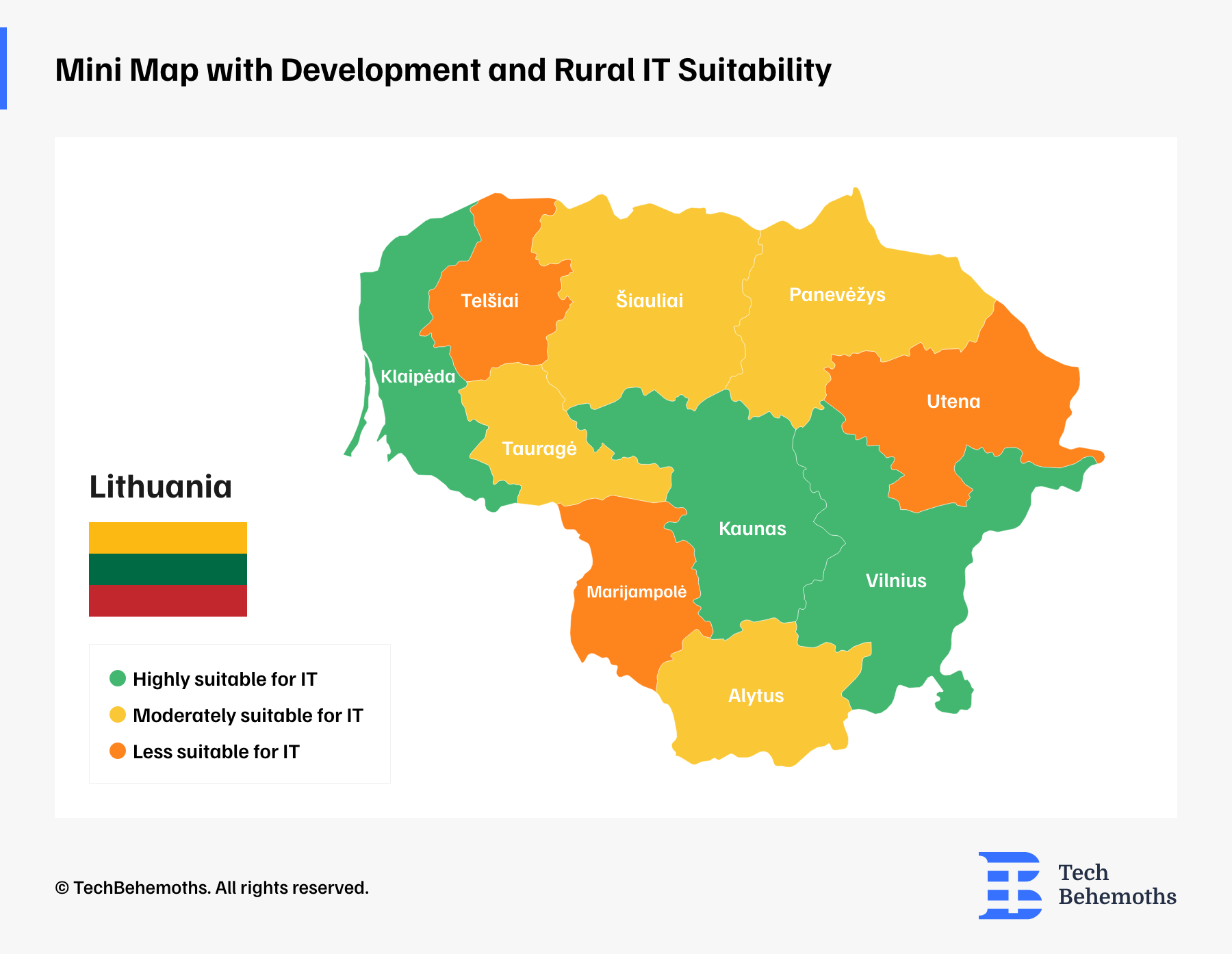
The different regions of Lithuania offer unique development opportunities. Cities like Vilnius, Kaunas, and Klaipėda are full of progress, while places like Šiauliai and Alytus are growing. However, others such as Utena and Telšiai face some challenges.
For anyone thinking of starting IT projects in rural areas, Vilnius, Kaunas, and Klaipėda are excellent choices with existing infrastructure and economic activity. Šiauliai and Panevėžys are promising, but have a lower population density. Alytus, Utena, Marijampolė, and Telšiai represent challenges due to limited infrastructure and economic activity.
What makes a place suitable for rural IT? Good internet, stable electricity, skilled IT professionals, training programs, the presence of established IT companies, and supportive policies such as tax breaks, grants, and co-working spaces are also helpful and of course a good quality of life.
Conclusion
In wrapping things up, it's worth mentioning that when we talk about opportunities and challenges in rural IT in Lithuania, it's not a one-size-fits-all situation. Different regions and communities have their distinct opportunities and challenges, calling for customized solutions. By keeping the investments flowing, developing infrastructure, and providing support for digital skills training, we can make rural areas more appealing to the IT sector.